helping you to navigate SciEng information
December 8th, 2008 by Eugene Barsky | No Comments »
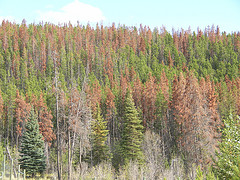
An article in the New York Times looks on the pine beetle epidemic in North America – “Bark Beetles Kill Millions of Acres of Trees in West”
Many people in UBC deal with this precise issue. For instance, try a search on a very general multidisciplinary database such as Academic Search Complete here.
For more comprehensive coverage of this topic , try Web of Science or Agricola databases.
** Photo by Stephen Rees
Posted in Main, News, Science - undegraduate classes, Wood Sciences | No Comments »
November 26th, 2008 by Eugene Barsky | No Comments »
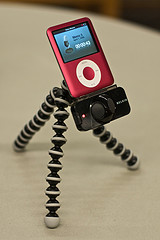
Here are four podcasts we recorded for the first annual Open Access day on October 14.
https://circle.ubc.ca/handle/2429/2689//browse-title
See all our Science and Engineering podcasts here
** Photo by andyi.
Posted in Main, News, Podcasts | No Comments »
November 18th, 2008 by Eugene Barsky | No Comments »
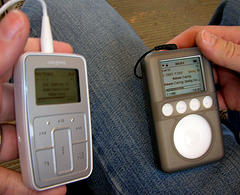
An article by Kevin and I has just been published early this week. It is free open access, please feel free to read and forward it to your colleagues:
Barsky E., & Lindstrom K. Podcasting the Sciences: A Practical Overview. Issues in Science and Technology Librarianship, Fall 2008.
Abstract:
University science education has been undergoing great amount of change since the commercialization of the Internet a decade ago. Mobile technologies in science education can encompass more than the proximal teaching and learning environment. Podcasting, for example, allows audio content from user-selected feeds to be automatically downloaded to one’s computer as it becomes available online, and then later transferred to a portable player for the user’s consumption at a convenient time and place. Enjoying a phenomenal growth in mainstream society, podcasting is asynchronous and could be provided at a distance from a classroom. This paper reports a case study from the University of British Columbia that implemented podcasting for physics content. It presents the rationale for, technical details, and step-by-step guide to creating podcasts in the sciences.
** Photo by Josh Bancroft
Posted in General Science, Main, News, Podcasts, Science - undegraduate classes | No Comments »
November 12th, 2008 by Eugene Barsky | No Comments »
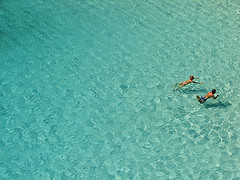
A major new global prize celebrating the work of both professional and amateur photographers has been awarded in Paris.
The Prix Pictet is the first competition of its type to focus on the global issue of ‘sustainability’ – and, this year in particular, on water.
The winner of 100,000 Swiss francs (£53,000) is the Canadian photographer Benoit Aquim.
Here is the BBC audioshow with the celebrated works – http://news.bbc.co.uk/2/hi/entertainment/7700551.stm
** Photo by visualpanic
Posted in Amusing stuff, Atmospheric Science, Earth and Ocean Sciences, Main, News, Science - undegraduate classes | No Comments »
November 5th, 2008 by Eugene Barsky | No Comments »

Now after the election, it would be interesting to see whether Senator Obama will perform on the science and technology issues his campaign has promised.
Here is Obama’s platform on STM issues, accumulated by the American Association for the Advancement of Science – http://election2008.aaas.org/comparisons/obama.shtml
Do you notice something of a particular interest to you?
** Photo by jmtimages
Posted in Atmospheric Science, Chemical and Biological Engineering, Chemistry, Civil Engineering, Earth and Ocean Sciences, General Science, Geography, Main, Materials Engineering, Mathematics, Mechanical Engineering, News, Physics, Science - undegraduate classes, Statistics, Wood Sciences | No Comments »
October 29th, 2008 by Eugene Barsky | No Comments »
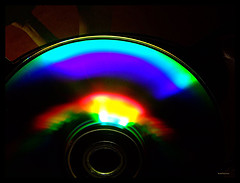
Our most recent article written by Dean Giustini and myself gets some good coverage in physiotherapy field…
UBC folks can see the full text here – http://www.swetswise.com/eAccess/viewFulltext.do?articleID=38506191
Your institution might have a different subscription to Physiotherapy Canada…
Barsky E., & Giustini D. Web 2.0 in Physical Therapy: A Practical Overview. Physiotherapy Canada, 2008; 60(3): 207-215.
Abstract:
In this guest editorial, we focus on the tools of Web
2.0: blogs, wikis, Really Simple Syndication (RSS) feeds,
social networking sites, and podcasting. We believe that
social software transforms how physical therapists (PTs)
obtain, process, and exchange information and how they
adopt best practices. The World Wide Web provides a
well-connected network of practitioners within which
knowledge exchange is open and social—two important
features of Web 2.0.1–3 Open exchange of information
and the freedom to share ideas are facilitated by new
technology. What impact do new information tools
have on PTs? How can these new tools be used to
improve patient care?
** Photo by true2source
Posted in Main, News, Science - undegraduate classes | No Comments »
October 22nd, 2008 by Eugene Barsky | No Comments »
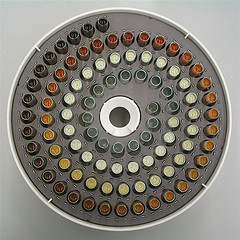
An interesting short read from the BBC Science section talks about Stanley Miller’s chemical experiments – http://news.bbc.co.uk/2/hi/science/nature/7675193.stm
The BBC piece refers to the this article published a few days ago in Science –
The Miller Volcanic Spark Discharge Experiment. Adam P. Johnson, H. James Cleaves, Jason P. Dworkin, Daniel P. Glavin, Antonio Lazcano, and Jeffrey L. Bada (17 October 2008). Science 322 (5900), 404. [DOI: 10.1126/science.1161527]
** Photo by tz1_1zt’
Posted in Amusing stuff, Chemical and Biological Engineering, Chemistry, Main, News, Science - undegraduate classes | No Comments »
October 17th, 2008 by Eugene Barsky | No Comments »
Here is the presentation we deliver on Mon Oct 20th 2008 for the Pacific NorthWest Forestry Librarians Group in FPInnovations – Paprican Division in Vancouver, BC
Your comments are very welcome!
Posted in Earth and Ocean Sciences, General Science, Main, Science - undegraduate classes, Teaching, Wood Sciences | No Comments »
October 15th, 2008 by Eugene Barsky | No Comments »
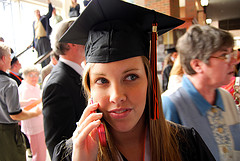
A technology report (PDF) by a Harvard University student shows that of all the digital tools that professors use, Harvard students find most useful online course material and syllabi.
The report said students want courses to have a Web site that contains readings, notes and other content so they can be accessed easily during the semester. The survey is based on responses last December from 328 undergraduates and 120 graduate students.
Is it the same with our UBC folks? Does it ring any bells for our faculty?
** Photo by AdamLogan
Posted in Atmospheric Science, Chemical and Biological Engineering, Chemistry, Civil Engineering, Earth and Ocean Sciences, General Science, Geography, Main, Materials Engineering, Mathematics, Mechanical Engineering, News, Physics, Science - undegraduate classes, Statistics, Wood Sciences | No Comments »
October 8th, 2008 by Eugene Barsky | No Comments »
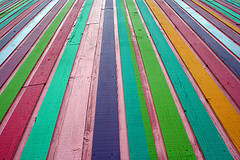
Released in June 2008 by Thomson Reuters (formerly ISI), this list shows the top ten nations ranked according to output of published journal articles in 22 main fields of science (including general social sciences), based on papers indexed by Thomson Reuters (excluding books, book chapters, and articles published in non-Thomson Reuters-indexed journals) between January 1998 and February 29, 2008.
http://sciencewatch.com/dr/sci/08/jun15-08_1/
** photo by 427
Posted in Atmospheric Science, Chemical and Biological Engineering, Chemistry, Civil Engineering, Earth and Ocean Sciences, General Science, Geography, Main, Materials Engineering, Mathematics, Mechanical Engineering, News, Physics, Science - undegraduate classes, Statistics, Wood Sciences | No Comments »
« Newer Posts - Older Posts »









